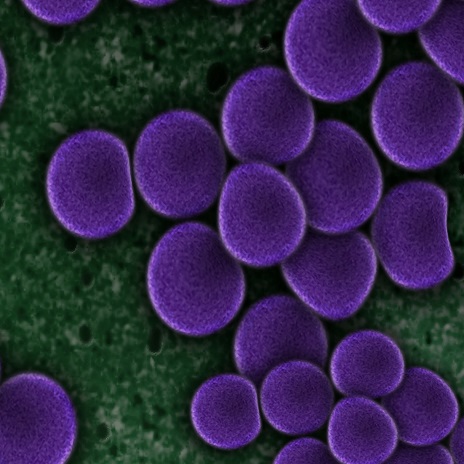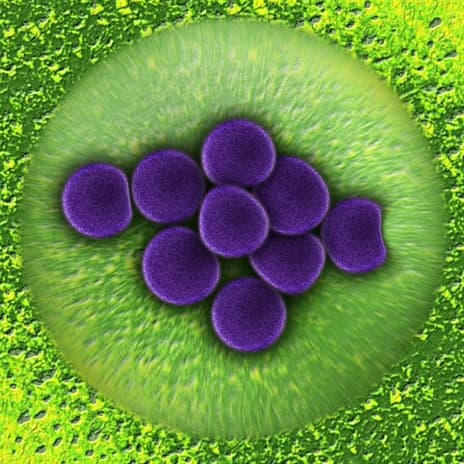
MRSA
WHAT IS MRSA --
METHICILLIN RESISTANT STAPHYLOCOCCUS AUREUS?
MRSA (pronounced MERSA), or Methicillin Resistant Staphylococcus Aureus is a type of staph bacteria that are resistant to methicillin antibiotic and often other antibiotics. First Discovered in the early 1960's, MRSA is a Super Bug that can colonize our bodies causing infections, rashes, boils, weeping sores and even death.
WHAT IS STAPH BACTERIA?
Staph bacteria are bacteria that live on our bodies and skin and may product infections. Many people carry Staph and have no sign of an infection. 25-30% of people carry Staph bacteria in their noses, without symptoms of an illness. Staph bacteria are one of the most common causes of skin infection in the United Kingdom UK, North America and the United States of America. The human skin is colonized by billions of living organisms both good and bad.
If you suspect you have been infected with Staph or MRSA, seek medical attention.
WHAT DOES MRSA, METHICILLIN RESISTANT STAPHYLOCOCCUS AUREUS LOOK LIKE?
Both MRSA and non-resistant staph may look like any other skin
infection, irritation or injury. The only way to know for sure if you have a staph infection is to see a doctor. MRSA staph infection , rash, boil, MRSA infection are common names for this infectious condition. Methicillin Resistant Staphylococcus Aureus and common staph infections may look like, but are not limited to, an abscess, a spider or bug bite, a rash, a pimple or a boil. It can look red and swollen, it may be painful, or there may be drainage, discharge or pus. MRSA left untreated by a medical professional can lead to death. If you have a boil, rash or injury that will not heal, see a Doctor. You may have infection that requires immediate medical treatment.
WHAT IS THE INCUBATION PERIOD FOR MRSA AFTER EXPOSURE?
The incubation period for most Staph is 1 to 10 days after exposure.
WHO GETS MRSA?
Anyone, although it is most common among people with weak immune systems, chronic or long term illness such as, but not limited to, Cancer, Hepatitis A, Hepatitis B, Hepatitis C, HIV, AIDS and other long-term or chronic disorders. Nosocomial infections (hospital associated or acquired infections) are also a large percentage of MRSA cases.
HOW DO I PREVENT MRSA, METHICILLIN RESISTANT STAPHYLOCOCCUS AUREUS?
The best way to help prevent MRSA is by washing your hands and avoiding contact with known active infections. Always use proper hygiene.
CAN I CLEAN AND DISINFECT MY HOUSE MYSELF?
There are no laws governing who may or may not clean a home where occupants have a MRSA infection. You may choose to hire a cleaning company which specializes in cleaning sights where MRSA or other pathogens may be present. There are products on the market that are effective against MRSA, and should list the MRSA bacteria on the label. If the product label does not say it is effective against MRSA, do not assume that it will adequately disinfect or sanitize MRSA.
MRSA MEDICAL WASTE DISPOSAL
Items contaminated with blood or body fluids, and used needles and sharps, in a health care facility, tattoo parlor, dental office or long-term care facility are regulated and disposed of by medical waste disposal companies.

METHICILLIN RESISTANT STAPH
HOW DO YOU CATCH MRSA, METHICILLIN RESISTANT STAPHYLOCOCCUS AUREUS?
HOW IS IT SPREAD?
MRSA Infection, Methicillin Resistant Staphylococcus Aureus in most cases is passed from person-to-person by direct skin-to-skin contact. Contact with items such as razors, towels, sporting and gym equipment, medical equipment, clothing and other contaminated personal items have also been suggested as a source of bacteria. Personal care items and make-up should never be shared. MRSA infections are common among people with weak immune systems, people living in health care facilities, nursing homes, long-term care centers and prisons. Institutions like these have developed infection control procedures to deal with outbreaks of the staph and MRSA infections.
ABOUT COMMUNITY ASSOCIATED MRSA (CA-MRSA)
CA-MRSA, Community Associated MRSA, or Community Associated Methicillin Resistant Staphylococcus Aureus, is becoming more common in populations that experience more skin-to-skin contact or share close quarters. CA-MRSA infections are acquired by persons who have not had a medical procedure or been in the hospital in the last year. Some examples of these include, but are not limited to, prisoners, ahtletes and military personnel, people in crowded living conditions, and drug addicts.
IS THERE A TEST FOR MRSA, METHICILLIN RESISTANT STAPHYLOCOCCUS AUREUS?
The FDA has approved a 2 hour quick test that may be available in your area. Your health care provider may take a swab or sample from the infected area for culture and identification by a Pathology Lab.
WHAT IS THE TREATMENT FOR MRSA, METHICILLIN RESISTANT STAPHYLOCOCCUS AUREUS?
Staph infections, and MRSA infections are both treated with antibiotics. MRSA is resistant to methicillin and some other antibiotics. Some infections may require the abscess or boil to be drained or may require a surgical procedure to remove the infection. Any draining, lancing, or surgical procedure should only be done by trained medical personnel.
CAN MRSA INFECTION, METHICILLIN RESISTANT STAPHYLOCOCCUS AUREUS, BE CURED?
In most cases MRSA infections may be brought under control. Many people carry MRSA, Methicillin Resistant Staphylococcus Aureus, in their bodies without ill effect for the rest of their lives. Preople who carry MRSA bacteria in or on their bodies are known as colonized.
IS THERE A VACCINE FOR MRSA?
No. Not at this time.
CAN I TREAT MRSA MYSELF?
MRSA is a serious bacterial infection that could result in death. It should always be treated by a physician or other qualified medical personnel. In most cases MRSA infection will not just go away once infected.
CAN MY PET CATCH MRSA?
Studies have found that households, where both humans and animals are present, can be colonized with MRSA.
OTHER NAMES & MISSPELLINGS for this virulent superbug are Mursa, Mersa, Mercer & Merca
